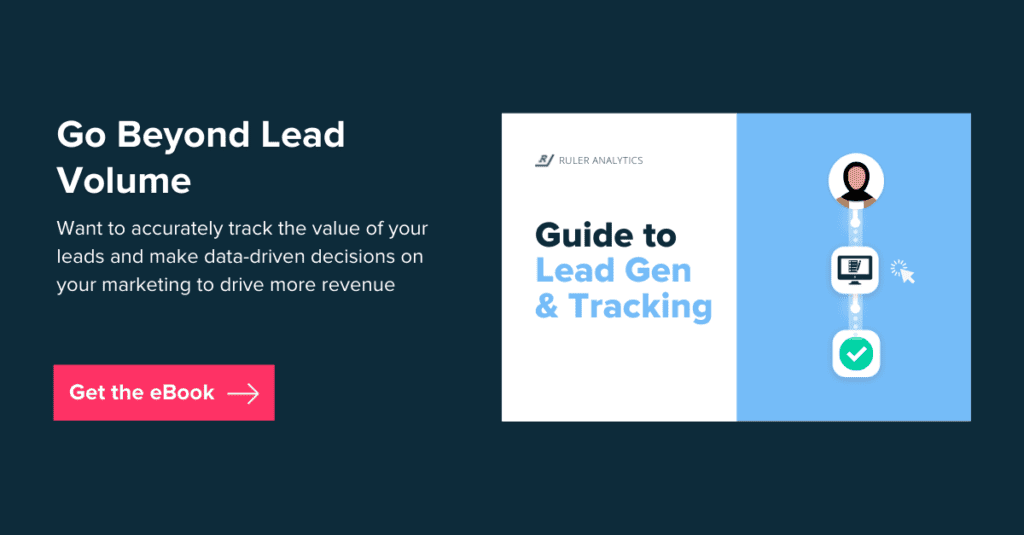LinkedIn lead generation adverts are a great way to drive new business for your B2B company. We walk you through how to improve your ads to increase impact on your bottom line.
91% of marketers say that lead generation is their most important goal. So important in fact, that 53% of marketers spend at least half of their budget on it.
But when you’re spending a large proportion of your marketing budget, you want to be sure that your efforts are having the desired effect.
As competition for ad space grows and attention share decreases, LinkedIn’s lead generation form ads offer an alternative ad type with minimal hassle.
We spoke to Emilia Lingwood from Blueclaw Media for her insight on lead generation for B2B with LinkedIn ads.
In this blog we’ll explore:
Let’s get stuck in.
Lead gen forms on LinkedIn are a great advertising option to remove barriers for users interested in converting.
Lead gen forms come pre-filled with LinkedIn profile data, letting members send you their professional info with just a couple of clicks. And even better, they don’t have to leave the social platform to become a lead.
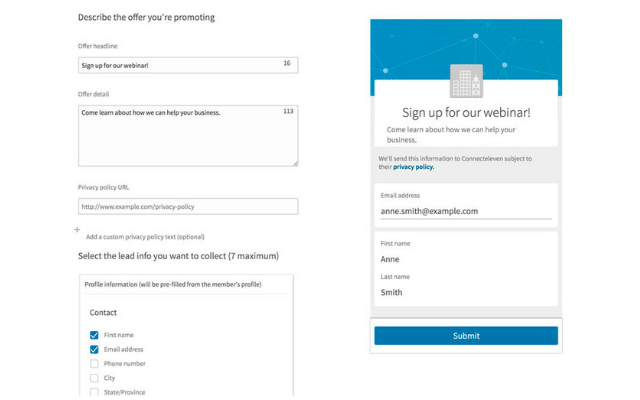
Similar to Facebook’s lead generation adverts, LinkedIn also offers lead gen forms to make advertising easy.
According to LinkedIn, the average conversion rate for lead gen forms is 13%, which is five times higher than the average conversion rate seen on landing pages.
⚡️ Pro Tip
Learn more about conversion rates by downloading our conversion benchmark report. We analysed millions of data points to understand what channels, content and conversion type worked best for each major industry.
Download the full report here.
“Many B2B businesses would likely find LinkedIn an effective advertising platform. Although LinkedIn Advertising is generally more expensive than the likes of Facebook and Twitter Ads, the targeting options for B2B really give it the edge.
“Any sector from tech to finance or consulting to recruitment should consider LinkedIn Ads”, Emilia said.
It’s not news that LinkedIn is generally quite an expensive platform.
We asked Emilia which businesses would most benefit from LinkedIn lead gen ads. She said, “Due to the higher CPMs (cost-per-thousand impressions), ads on LinkedIn are better suited for higher value products and services.
“Businesses only offering products or services under the £200-300 mark probably won’t see as high success with LinkedIn advertising. To get a significant conversion rate for a positive return on ad spend, they would need an incredible offer to see success.”
Related: ROAS: What it is and how to calculate it
Just like any type of paid advertising, it usually works best when running alongside strong organic content.
Emilia agreed, “Paid advertising on LinkedIn can complement content marketing very well. By taking the additional step to promote on-site content, the business can begin to capitalise on the content marketing strategy whilst waiting for the search engines to catch up and start rewarding organically.
But it’s not just limited to content marketing. Emilia added, “It’s very common for businesses to do content marketing or PR activity and it’s also common for a business to do PPC. Both have their benefits, but it’s not as common as you would think for the two to be used in tandem. If budget is available, you can really reap the benefits from taking this extra step.
“Another option to consider is using LinkedIn ads in conjunction with the customer journey. We find that creating content campaigns first, and then serving a highly targeted lead gen form can up your conversion rates.”
Related: How to track full customer journeys
Before you get started with LinkedIn lead gen forms, there are a few things to think about.
That’s your targeting, creating your budget and your collateral.
All of these are important when it comes to getting success on LinkedIn. When you’re spending precious budget, you want to be sure you take the time necessary to set up your ads as best you can.
The first thing to think about when considering a lead generation form on LinkedIn is your targeting.
Emilia said, “LinkedIn has some unique targeting options that are geared towards B2B. You can choose to target members by specific LinkedIn groups, interests, industry, and more.
“You can even target by company name, which is great if you have a strong understanding of the companies that make up your existing customer base. Then, you can go after similar companies, or ones that are currently in your sales cycle to give them an extra nudge.

“LinkedIn also has a useful forecasting tool which loads as you select your audience targeting. It estimates the CPM, impressions, clicks and leads that you will get for the set budget. It’s not an exact science but gives a good estimate.
“The narrower an audience is the more expensive it tends to be so keep this in mind, although how desirable the audience is for others to target also comes into play.”
⚡️ Pro Tip
Want to see exactly how much revenue your ads are generating, rather than just number of leads? Here’s how Ruler attributes revenue back to your marketing.
We all know LinkedIn advertising is expensive and you will need a considerable budget to get started.
Emilia agrees, “Advertising on this platform is costly (£15-£30 CPMs depending on the targeting options), but targeting options are superior and generally more effective as users have a professional incentive to keep their profile information up to date.
It’s also generally a more trusted platform. Business Insider also found that social media users are more receptive to ads on platforms with high digital trust.
Related: How to improve ROAS with Ruler Analytics
“I recommend a budget of at least a couple of thousand pounds to get you started. This is to make the time for the campaign set up worthwhile. It is best practice to test 2-3 audiences with the same ads so you can determine which works better. You can then begin to optimise the campaigns by allocating more budget to better performing audiences and pausing weaker performing ones.”
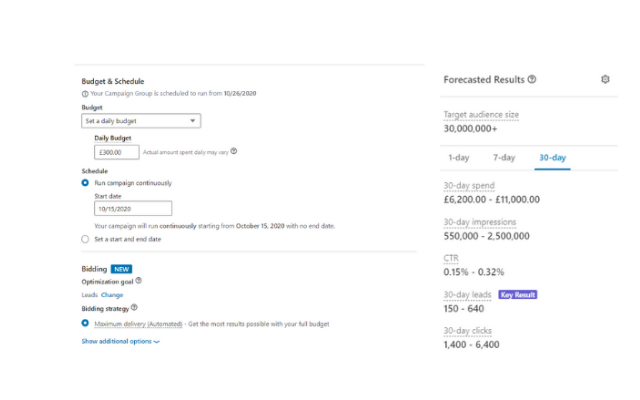
To make sure you’re making the most of your budget, you need to ensure you’re tracking its impact effectively. We’ll come onto that in a bit more detail shortly.
But remember, using an attribution tool can allow you to better place your ad spend based on what’s driving sales, rather than just clicks and leads.
Related: How Ruler affects paid advertising strategy
Not sure how to best promote a lead generation form? Lead magnets are an obvious choice.
Emilia added, “It’s not a new thing to promote lead magnets on LinkedIn. As with all marketing, getting the content right is about aligning content to your goals. Know what appeals to what audience at every stage of the buying cycle.
“Trying to attract new audiences with product-led ads is unlikely to yield much interest. These ads are too bottom of the funnel for people who haven’t ever come across your brand before. The only get around is if you’re promoting an amazing offer.
“For B2B businesses that have a long sales cycle, running ads to promote gated long-form content can work well. Offer a useful nugget of insight in return for contact information. This is a much more seamless way of engaging with a new audience. Try an informative video, data-led content or a whitepaper. Once users have interacted with these gated content ads, you can then begin to re-target with more product-specific ads.”
Now you’ve got those three big hurdles sorted, you can get on with setting up your lead form ad in LinkedIn.
It’s easy to set up.
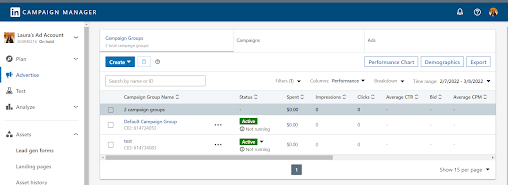
And that’s it! Your form is ready to go. You just need to then attach your form to campaigns. Remember, you have to select the lead generation objective in order to be able to do this.
Just like with any marketing activity, you should set your KPIs to align with the goals of the ad campaigns. For lead gen forms on LinkedIn, obviously the number of leads is the main KPI. But, you can go beyond that.
By integrating with marketing attribution tools like Ruler, you can see which leads from your ads close into sales. This is a great way to learn what parts of your marketing are working.
Just take a look at the sources report in Ruler. You can clearly pinpoint how many clicks, leads and sales each marketing channel is generating. And this is just the tip of the iceberg.
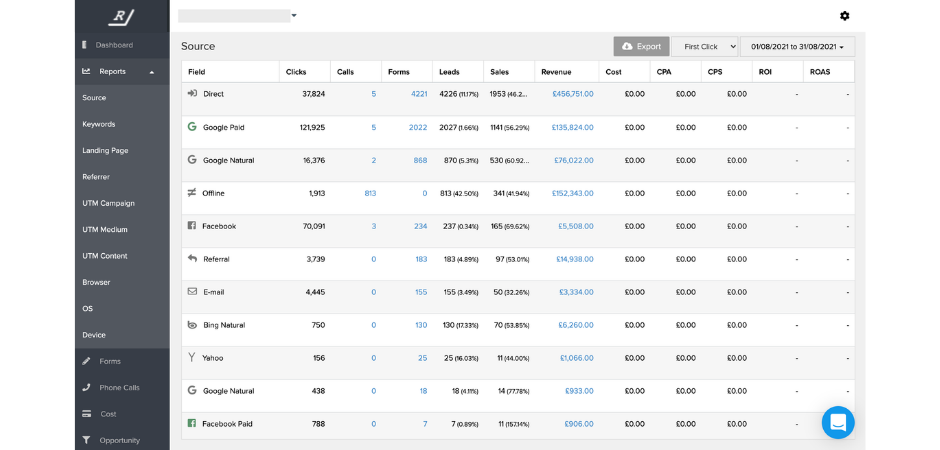
Related: All the data you’ll be able to see in Ruler
Other secondary metrics can also give an indication of what aspects of a campaign are working well and what aren’t. For lead gen forms, it’s a good idea to optimise for revenue and number of leads.”
LinkedIn lead generation forms are a great opportunity to get your product front of mind to a very targeted audience. By tracking revenue generated, you get a true return on your ad spend, and visibility on your lead generation. Ultimately, you’ll see a huge impact on your bottom line.
Find out more about the work Blueclaw does to support B2B businesses to generate leads across paid social, SEO and more. Or, get started with marketing attribution by booking a demo of Ruler Analytics.
You’ll be able to see your marketing data in a clear and simple format that will allow you to make smarter decisions on how to optimise your outputs.
